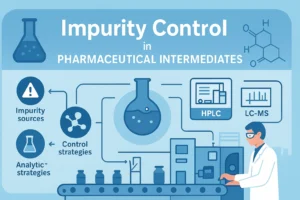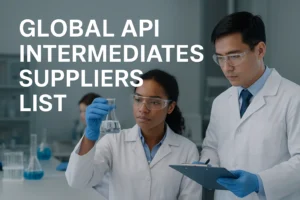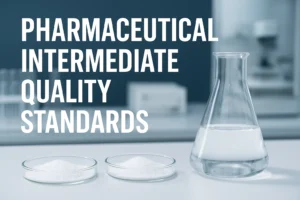In the pharmaceutical industry, there’s a saying: “Quality is manufactured, not inspected.”
The essence of this lies in controlling the source — the very beginning of production.
For buyers, choosing a qualified pharmaceutical intermediates supplier, especially one that is GMP-certified, is far more than completing a procurement task. It’s a crucial decision that safeguards the quality, safety, efficacy, and even the reputation of your final pharmaceutical products.
Amid a market full of suppliers, how can you cut through the noise and make the most reliable, informed decision?
This article draws on industry experience and the core principles of GMP to present a clear, actionable evaluation framework.
Step 1: Understand the True Meaning of “GMP Certification”
Before you start screening potential suppliers, it’s essential to align on what GMP certification truly represents.
GMP (Good Manufacturing Practice) is a set of mandatory standards and regulations governing drug production. It focuses not only on the final inspection of products but also on a comprehensive, system-wide quality assurance process that covers every stage of manufacturing.
More than a certificate: GMP is not just a document — it’s a management system that encompasses personnel, equipment, raw materials, manufacturing processes, quality control, warehousing, and distribution.
Dynamic, not static: Compliance isn’t a one-time achievement. GMP requires continuous adherence and ongoing improvement.
Documentation and traceability: Every operation must have a Standard Operating Procedure (SOP), and every action must be recorded, ensuring full traceability for every batch of products.
In essence, selecting a GMP-certified supplier means verifying whether they have fully internalized the GMP philosophy into every aspect of their daily operations.
Step 2: The Practical Evaluation — Five-Step Screening Method
Step 1: Qualification Review — Verify Authenticity
This is the foundation of supplier evaluation. You should request:
Valid GMP certificate: Confirm that the manufacturing site is certified by national or international authorities such as the NMPA, U.S. FDA, or EU EDQM. Pay attention to the certificate’s validity period and whether the certified scope includes the intermediates you need.
Business license and production permit: Ensure the supplier holds legal production and operating qualifications.
Third-party audit reports (if available): Reports from well-known pharmaceutical companies carry significant credibility.
Pro Tip: Beware of suppliers whose certificates are unclear, outdated, or whose certified scope does not match their products.
Step 2: Deep Dive into the Quality System — Seeing the Whole from the Details
Having the right certifications is just a ticket to entry; the true measure lies in the robustness of the quality system. Through questionnaires or preliminary discussions, assess:
Independence and authority of QA/QC departments: Does the quality manager have the authority to independently halt production if non-conformities occur? This reflects a company’s true quality culture.
Supplier management system: How do they evaluate and control their raw material suppliers? This demonstrates their upstream quality control capability.
Change control, deviation handling, and CAPA systems: A mature quality system can effectively manage production deviations and prevent recurrence. Request an example of a deviation-handling case.
Stability data: For intermediates with specific storage requirements, long-term stability studies are critical for assessing product lifecycle quality.
Step 3: On-Site Audit — Seeing Is Believing
For strategic or long-term partnerships, an on-site audit is indispensable. No document can replace firsthand observation.
Focus on:
Hardware facilities: Is the plant layout logical? Are cleanrooms compliant with classification requirements? Are production and maintenance properly managed?
Documentation and records: Are records accurate, timely, and complete? Do staff strictly follow SOPs?
Personnel competency: Talk directly with production and QA managers to gauge their expertise and attitude toward quality.
Hygiene and environment: Cleanliness and facility management often mirror a company’s overall culture and discipline.
Step 4: Product and Technical Compatibility — Ensuring the Right Fit
Even a strong supplier must align technically with your product needs.
Technical capabilities: Are production processes stable and validated? Can the supplier provide process flow charts and supporting data?
R&D and customization capabilities: If you require custom intermediates, does the R&D team have sufficient technical strength?
Regulatory alignment: Are their quality specifications and analytical methods consistent with your standards or pharmacopeial requirements?
Step 5: Comprehensive Strength and Partnership Potential — Thinking Long Term
Procurement is not just about buying products; it’s about building partnerships.
Production capacity and supply chain stability: Can they guarantee consistent, long-term supply? Is their upstream supply chain reliable?
Communication and responsiveness: Do they respond promptly and professionally to technical or pricing inquiries? Efficient communication ensures smoother cooperation.
Cost-effectiveness: Evaluate price competitiveness while keeping quality as the non-negotiable foundation. Remember, in pharma: “You get what you pay for.” Unrealistically low prices often signal hidden quality risks.
Conclusion: Eliminate Risks at the Source
Selecting a GMP-certified pharmaceutical intermediates supplier is a systematic and rigorous due diligence process. It requires moving from:
“Checking certificates” to “Assessing systems,”
“Listening to words” to “Observing actions,”
“Reviewing files” to “Auditing on-site.”
As a responsible procurement professional, your diligence protects not only your company’s reputation but also patients’ health and safety.
By applying this five-step evaluation framework, you can establish a reliable supplier base and build a strong foundation for consistent, high-quality pharmaceutical production.
Take Action Now
Use this guide to re-evaluate your current or potential suppliers. Or consider partnering with Tianming Pharm Group, a trusted manufacturer specializing in pharmaceutical intermediates.
We adhere strictly to GMP standards, maintain full process traceability, and uphold our belief that “Quality is life.”
Choosing Tianming means choosing safety, reliability, and confidence in every batch.
WhatsApp:+86 176 6371 3557
Email: sunqian0123@gmail.com



